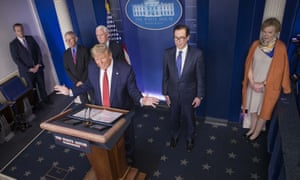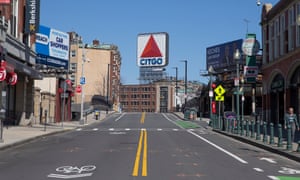Will the coronavirus crisis spell triumph or disaster for Donald Trump?
The president was slow to address the pandemic that is plunging the US into recession but could an economic bounceback come in time to aid his re-election hopes
- Coronavirus – live US updates
- Live global updates
- See all our coronavirus coverage

Photograph: Rex/Shutterstock
On the day of Donald Trump’s election, economists predicted calamity.
“We are very probably looking at a global recession, with no end in sight,” wrote Paul Krugman, a columnist at the New York Times.
The US president and his allies have spent the past three years crowing, mocking Krugman as a prophet of doom. What no one could have predicted is that when the doomsday prophecy came true, it would be the result of a lightning bolt not of Trump’s own making.
The scale of the economic devastation wrought by the coronavirus pandemic became clear on Thursday when it emerged that 3.3 million people filed for unemployment insurance last week. It was almost five times the previous record, set in 1982, and by some estimates the jobless figure could reach 12m to 15m before the storm has passed.
Suddenly the political landscape has changed. A presidential election and races in the Senate and House are set to take place with an economy undergoing both the biggest contraction and the worst surge in unemployment ever seen. In Washington, a city of heroic statues and soaring monuments, the most relevant now is the Franklin Delano Roosevelt Memorial, with its bronze figures huddled in a Great Depression breadline.
In the race for the White House, there are some key questions. Will Trump be blamed, justifiably or otherwise, for millions losing their jobs? Or will voters embrace his claim to be a “wartime president” and conclude this is no time to change? Can his likely opponent, Joe Biden, capitalise on his own strengths as a voice of competence and experience, to present himself as the moral leader the nation needs?
For Trump, this is personal. As a billionaire businessman, he predicated his entire political identity on his ability to steward the economy by slashing regulations, shredding trade deals and reviving manufacturing towns.
For three years he bragged “JOBS JOBS JOBS!” and never missed a chance to tout unemployment figures for the population at large – just last month, the rate was at a 50-year low of 3.5% – and African Americans and Latinos in particular. The true picture was more complicated and unevenly distributed, but the central message was: you’ve never had it so good.
Trump’s other vital sign of virility, the stock market, has been smashed too, nearly all the gains of his presidency wiped out. It was this more than anything, perhaps, that belatedly persuaded him the virus could not simply be wished away.
It is therefore no surprise the president is itching to get the economy fired up again. His push for an Easter Sunday deadline may be ethically callous and scientifically ignorant but politically shrewd. It meant that as the apocalyptic jobless figures hit, he could present himself as already working to get it fixed.

As time wears on and Trump continues to agitate for an economic restart, he may seek to shift the blame to medical experts and state governors for holding America back. The message, doubtless amplified by Fox News, will be: “Look, I tried, but my hands were tied.”
Trump is about to sign Congress’s $2.2tn aid package designed to prevent complete economic collapse. His treasury secretary, Steven Mnuchin, did most of the hard work but the president gets to claim the credit. For Democrats, like all opposition parties in wartime, there is a difficult balance in holding Trump accountable while not appearing to undermine national unity. They also have to work with Republicans to keep the money flowing until there is light at end of the tunnel.
Henry Olsen, a senior fellow at the Ethics and Public Policy Center thinktank, wrote in the Washington Post: “We should know by June if this approach works.
“If it does, the number of Covid-19 infections will have plummeted, deaths from the virus will have flatlined, and people will be coming back to work in droves. It could be the biggest V-shaped economic recovery in US history – the political-economy version of the resuscitation of a patient after an induced coma.”
Olsen added: “It’s too early to predict what the political fallout from a successful pirouette would be, but it’s hard to see how it doesn’t at least insulate President Trump from much criticism about the virus’s arrival to begin with. Democrats can say he should have done more, but the fact remains that no other western leader did better to anticipate the onset of the coronavirus.
“Trump’s critics are not going to change their stripes, but the few people who remain open to persuasion are as likely to credit Trump as to blame him.”
This is the best-case scenario for the president: presenting himself, however spuriously, as the man who led America through its greatest crisis since the second world war, early missteps long forgotten. Biden, meanwhile, is struggling to break through the cacophony and to master the internet, his thunder stolen by New York’s Democratic governor, Andrew Cuomo.
Bill Galston, a senior fellow at the Brookings Institution thinktank in Washington and former policy adviser to Bill Clinton, said: “Most people believe this kind of crisis plays to Biden’s strengths. Against that, with the people involved in his campaign, he’s not been very effective at showing that strength.
“They’re not very innovative. They don’t seem to have a strategy to keep him in the conversation. They seem a little flummoxed by the technology of the situation.”
The worst-case scenario for Trump looks very different. If the death toll keeps climbing, big and small businesses are ruined and the economy sinks into 1930s-style wreckage, his early denialism will be played endlessly in election attack ads. His mendacious press briefings will be taken as proof that he could not rise to the challenge and Democrats will be more energised than ever to dispatch him.
So far, polls suggest Trump is getting a bump like George W Bush after the 11 September 2001 terrorist attacks. A Gallup survey published on Tuesday showed 60% of Americans gave him positive reviews for his handling of the coronavirus outbreak, and his overall approval rating matched the highest point in his presidency, at 49%, included rises among independents and even Democrats.
But this was taken before he reversed his reversal and went back to downplaying the virus, and before the unemployment figures delivered an almighty gut punch.
There is a long way to go. It is hard to believe that Trump’s impeachment trial ended only last month. In those terms, the November election is still a lifetime away.



